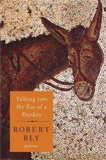Reviewed by Gregg Mosson
W. W. Norton
500 Fifth Avenue
New York, New York 10110
ISBN 978-0-939-08022-3
2011, 107 pp., $24.95
www.wwnorton.com
In this age of electronic technological innovation—from electricity to the Internet—it’s good to know a mystic poet can still live on a farm in America and write about very simple things, in surprising ways. That poet is Robert Bly. He does it well in his latest book, Talking Into the Ear of the Donkey, published in his ninth decade. The book adds to Bly’s oeuvre, especially the opening ghazal poems, as good as any he has written. Bly’s latest will delight fans, like myself, who encounter this poet late in his life, and discover in fireside-chat language both a mystic and rewarding human perspective on the world and on living.
In “The Sympathies of the Long Married,” Bly combines experiential writing with the leaping imagery and logic long associated with his poetry. Bly’s confessional work, more prevalent here than in prior collections, is enlarged with learning and references springing from Medieval and Eastern philosophies, mystic poets such as Rilke, Whitman, and Rumi, and to global poetic traditions. Bly’s Americanized ghazal opens:
Oh well, let’s go on eating the grains of eternity.
What do we care about improvements in travel?
Angels sometimes cross the river on old turtles.
Here we see a poet talking about old age and how it has changed his perspective of time and space. At the same time, sans biography, the lines above can stand for a statement in favor of the contemplative life over ‘progress’ (in line 2). Like Blake who could see the world in a grain of sand and alluded to in line 1, Bly is content to travel through the eternities of daily life. This constitutes a stoical triumph, considering that the poem by implication understands the passing of youth and its pleasures and strengths. Unlike Blake who saw the world in a grain of sand, and “eternity in an hour,” Bly here is “eating” the grains of eternity. This review would become a book if I tackled all aspects of this six stanza poem.
Bly’s ghazal offers a three-line stanza, with a repeating phrase often at the end of each stanza, a refrain. Bly also combines Biblical, literary, and mythological references with casual diction, with questions, and with emotional utterances, all of which creates interesting viewpoints, counterpoints, and rhythms. In the fifth stanza of the same poem, Bly exclaims:
It’s all right if we’re troubled by the night.
It’s all right if we can’t recall our own name.
It’s all right if this rough music keeps on playing.
In “Paying Attention to the Melody,” the ghazal opens:
All right. I know each of us will die alone.
It does not matter how loud or soft the sitar plays.
Sooner or later the melody will say it all.
Bly poetry presents common wisdom in an inventive way. Here, it plays with a cliché: Hear the music. Yet Bly does not simply restate this metaphor. For instance, the first line begins with a theatrical utterance, as in a play. “All right,” the poet says, implying an off-stage preceding dialogue. The in media res beginning creates a desire to know more. Then Bly states, “I know each of us will die alone,” which is invested with energy here because the phrase is not some objective statement, but a stream-of-consciousness remark after the poet just made up his mind (“All right.”). The speaker states, “I know,” and decides to believe it. Thus, maybe there is doubt too.
Lines 2 & 3 then present a conflict that the poem tackles. The “sitar” player is trying to play his or her own music, to also control music by making it more or less “loud or soft.” However “[s]ooner or later,” the musician’s creation will express its own “melody” and story: human mortality. If the opening stanza is interpreted to be about art itself, subjectivity becomes objectivity despite best intentions, and offers unintended and universal messages. Wisdom, for Bly, is experience’s lesson which we do not always want to hear (“Sooner or later the melody will say it all.”).
Bly ends the poem in a self-knowing and charmingly candid manner:
Robert, don’t expect too much. You’ve put yourself
Ahead of others for years, a hundred years.
It will take a long time for you to hear the melody.
Poetry readers who prefer the confused contemporary scene of American poetry, where poets use disjunctive language to recreate the experience of being overwhelmed by everything, should look for a different poet. Readers who believe poetry should teach and delight should dwell here. Bly’s Talking Into the Ear of the Donkey is only book-ended by ghazals. There are a number of plain poems in the middle that offer ostensibly autobiographical snippets from the latter part of a long life, in simple elegant writing. This sort of honest writing can also fall flat, and sometimes does here too. For readers unfamiliar with Robert Bly, I recommend his first book Silence in the Snowy Fields (1962) and the more recent and excellent My Sentence Was a Thousand Years of Joy (2005). For poetry readers interested in Bly the poet at his most plainspoken and also in his leaping musical idiom, check out Talking Into the Ear of the Donkey (2011).
D.H Lawrence, in his poem “The Mystic,” defines the mystic as someone simply alive to experience. Lawrence closes: “But if I eat an apple, I like to eat it with all my senses awake./ Hogging it down like a pig, I call the feeding of corpses.” Bly’s work embraces that sort of mystic naturalism of Lawrence and Lawrence’s precursor Walt Whitman. Unlike them, Bly’s mysticism is also one of detachment from the moment. Bly mixes the present with the historical and with archetypes. Here, acrobatic knowledge and allusive, leaping imagery make hearty food.